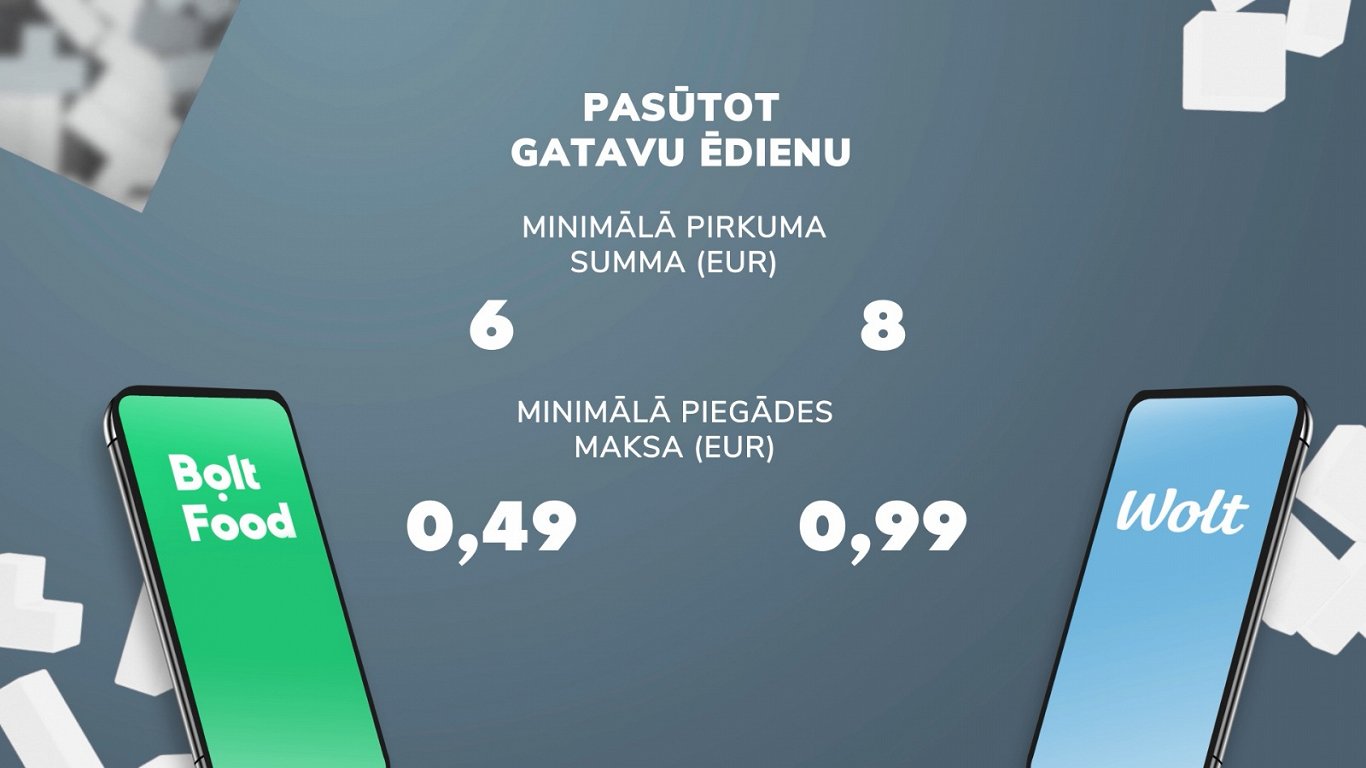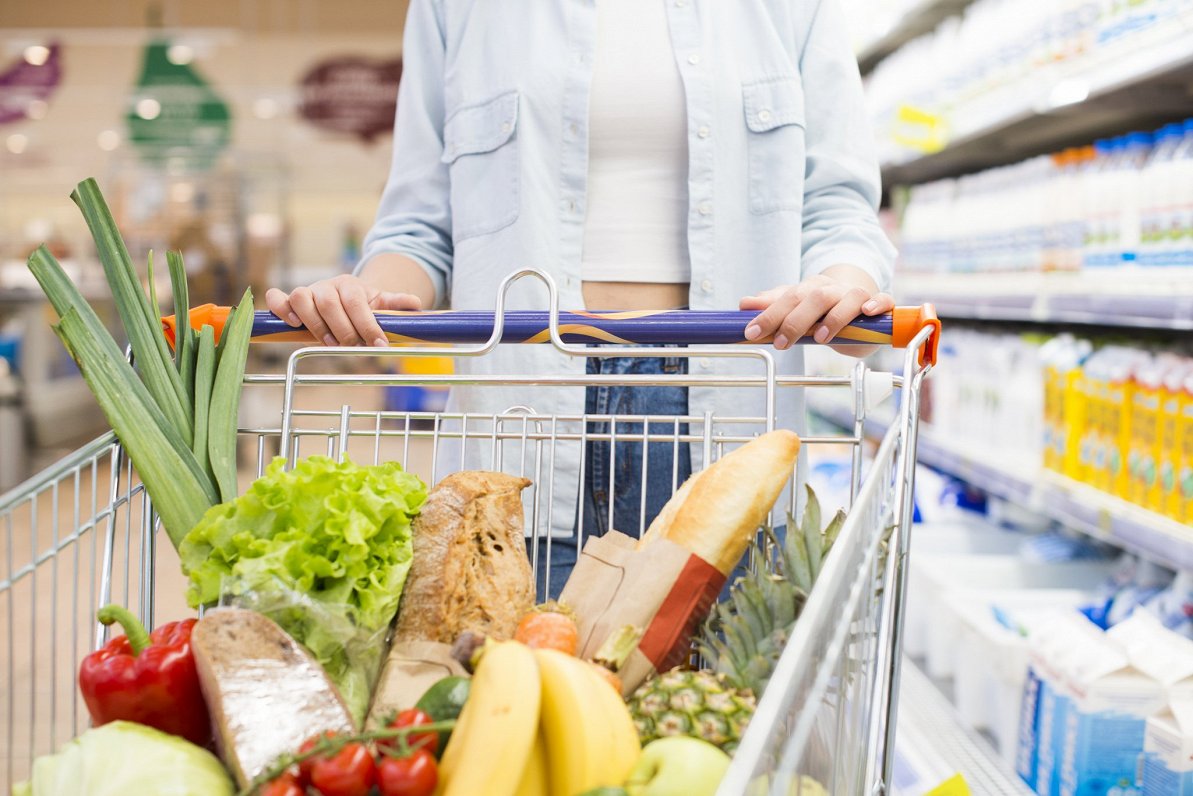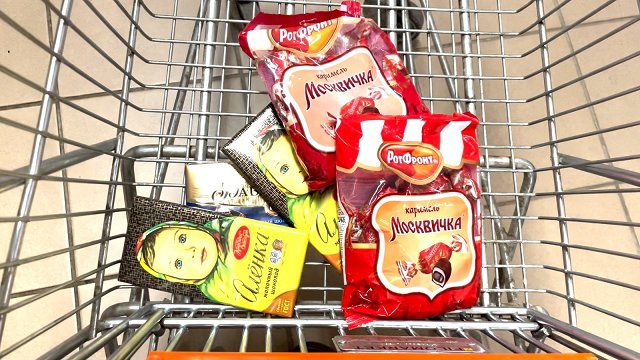In March, the first state of emergency highlighted three main problems in the grocery store sector: not enough choice, delivery delays, and unavailable deliveries in some regions. Have the issues been addressed?
Empty shelves - cause for concern?
Moments after the announcement of the emergency in March, shops were crowded by people who were hurriedly filling their shopping carts with various goods – mostly buckwheat, toilet paper and canned foods.
Sanita Bērziņa, head of the Internet food and household goods store Barbora, said that last year the average number of goods per purchase was 23, but at the beginning of the pandemic it increased to 30. Both the total number and volume of goods purchased have increased. Food shelves became significantly emptier in March.
A new emergency has now been announced and the number of new cases is significantly higher. Is there a reason to be concerned about empty shelves again?
“We do not yet feel any supply delays, but we have already received the first signals that there are some factories that have closed in Europe and there may be a shortage of certain goods at some point,” said Barbora Chief Executive Bērziņa, adding that everything depends on whether the suppliers have bought the goods in advance.
Bērziņa also pointed out that there was no reason to worry, because there is a wide range of alternatives. If one producer's pasta is not there, others are available.
Bank of Latvia economists Oļegs Krasnopjorovs and Andrejs Bessonovs have analyzed the dynamics of global prices of six main raw materials – grains, meat, milk, fish, sugar and coffee – in 2020 and their impact on inflation in Latvia. They have concluded that in 2020 the impact of global prices for raw materials on Latvian inflation is not significant. No cause for concern was found regarding rapid increases in food prices.
People avoid contact in stores
Consumers' shopping habits changed under the impression of the pandemic: people began to avoid contact with shop employees and other shoppers. The Maxima store chain installed more than 140 self-service cash register in Latvia last year. Previously, the average purchase amount with self-service was €10, but this year the largest purchase was even €700 in value.
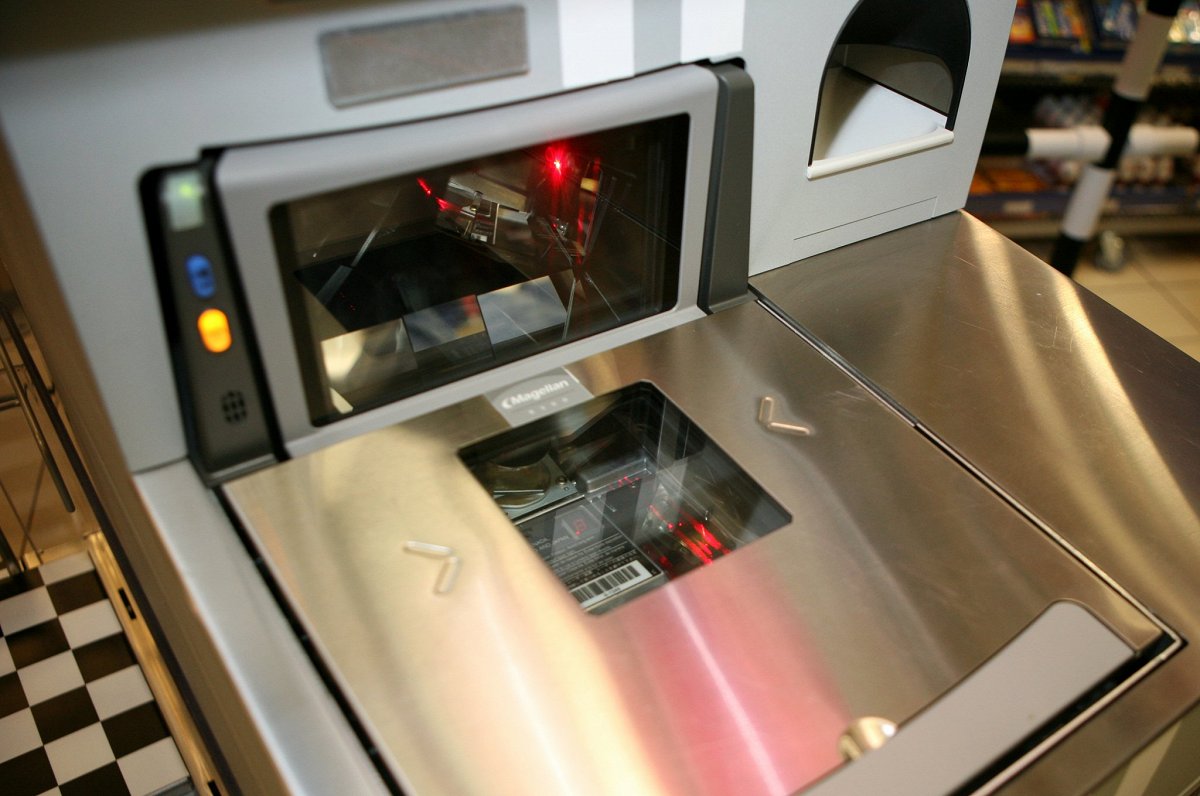
“Self-service cash registers have already become favorites among customers, because it is an excellent way to provide everyone with fast, convenient and secure shopping, while also reducing the workload of employees,” said Viktors Troicins, chief executive of Maxima Latvija.
People's interest in shopping at Internet stores also increased this year.
In March, the websites of Internet shops were slower and deliveries had to be expected for more than a week and a half. Sanita Bērziņa, the head of Barbora, admits that they were not prepared for the spring. “It literally happened in a few hours. The panic was very sudden and we couldn't react so quickly.”
On the first day after the emergency was announced, the influx of customers on the home page was so large that the servers failed to load.
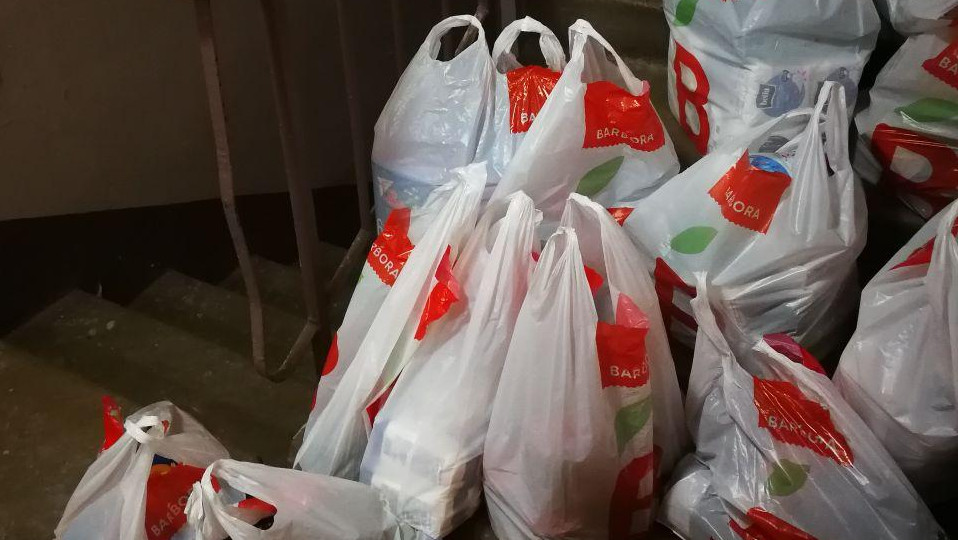
Pandemic forces to change and improve
During the pandemic, demand grew not only for food products, but also for ready meals, which can be ordered in Rīga and vicinity, and also in other cities of Latvia via mobile apps Wolt and Bolt Food. The head of Wolt in the Baltics, Liis Ristal, said that demand had been the same as before in the beginning of the year until mid-March, but after that, people ordered more than usual: “especially at lunchtime, because people stayed at home and couldn't visit cafes and other catering facilities”. Wolt Latvija was founded in 2016 and is owned by the Finnish company Wolt Enterprises.
In the summer, the infection rates decreased and the volume of virtual purchases also decreased. They were almost the same as before the pandemic. Companies used this time to increase the number of their employees. The more employees, the sooner the orders can be delivered to customers.
Barbora Chief Executive Bērziņa says that by the end of the year, the number of employees will have tripled compared to the beginning of the year: “We are expanding not only the number of assembly sites, but also the number of orders we can complete at each assembly site.”
Chain Rimi also said that development projects are accelerated, capacity has grown and areas for delivery are extended.
Food delivery apps Wolt and Bolt food have also employed more couriers. Wolt CEO in the Baltics Chief Ristal said the company had planned to offer supplies from grocery stores only from 2021, but it was introduced earlier this year due to growing demand.
Waiting times have also significantly reduced. In the spring, delivery from grocery stores had to be ordered a week in advance, but now, Barbora delivers on the same day or the next, whereas Rimi - within one to three days.
One of the main challenges was and still is the availability of food delivery in the regions. In Rīga and vicinity, choices are extensive – food products are supplied by a number of companies, as well as food delivery apps Wolt and Bolt food.
Henriks Danusēvičs, Chairman of the Board of the Latvian Traders Association, explains that the supply of food products in the regions is limited because of the small density of the population. It does not pay off to maintain such a service.
Similarly, creating a website for e-commerce is expensive: “At least 100 thousand have to be invested by an entrepreneur,” said Danusēvičs.
Which is more cost-effective?
The LTV broadcast examined how much it cost to order food at home through the services of various companies.
It was found that the cheapest delivery was Citro e-store. There is no minimum purchase amount, but delivery is free starting at €20. Under that amount, delivery costs €3. Citro offers delivery in Ventspils and Rēzekne.
Rimi, Barbora and Top e-stores have a minimum purchase amount of around €20. Rimi and Barbora also offer free delivery, but it is only available when ordering above €50. The most expensive delivery is from the Top store, up to €6.
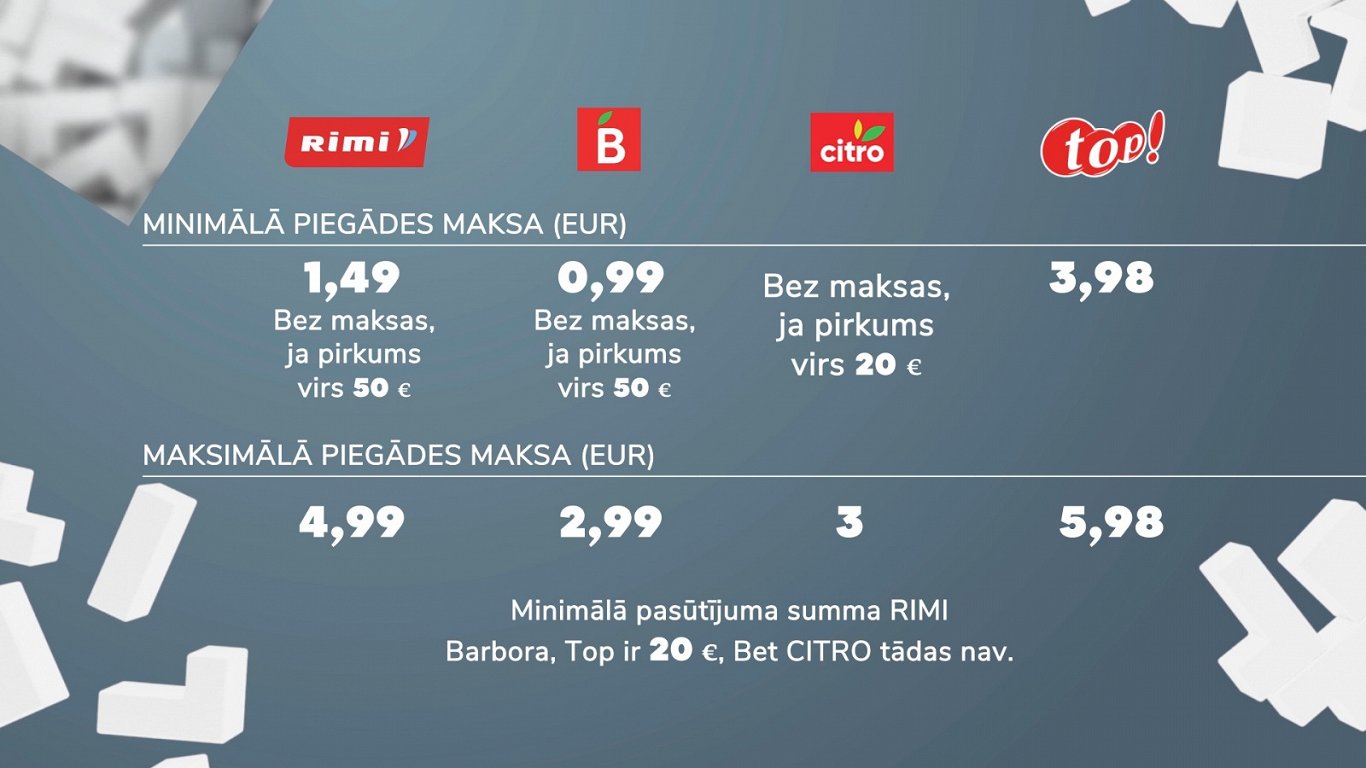
The apps Bolt food and Wolt offer delivery from both restaurants and stores. When ordering groceries the Bolt Food app will offer a lower price — all purchases from stores have the same minimum purchase amount and a delivery fee of 49 cents. On the other hand, the minimum purchase amount for “Wolt” will depend on the selected store and delivery fee starts at 99 cents.
